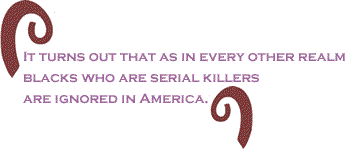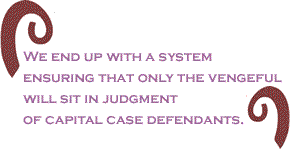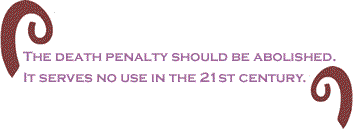
|
|||||||||||||||||||||
|
“There aren’t any black serial killers.” This refrain was on the lips of most Americans in the fall of 2002 before two suspects were apprehended in the Washington, D.C. area sniper shootings. Black people are so accustomed to being suspect, to being thought of as the worst, that we hang on to any and every truth or half-truth which absolves us of wrong doing. Anyone who was not disposed to racial pride didn’t object either because persons with the dubious title “serial killer expert” told us that black people were not among their subjects of study. It turns out that as in every other realm blacks who are serial killers are ignored in America. Black killers and their victims, who are also likely to be black, don’t merit attention. It didn’t help that endless and ultimately useless news stories told us that the suspect was a white man in a white truck. The arrest of two black men in a blue car came as quite a surprise. We can’t allow the sensationalism and shallowness that inevitable result from coverage of criminal cases to dissuade us from asking an important question. How should our society treat the worst among us? John Muhammad and Lee Malvo certainly fit into the category of the worst. For weeks their ten-victim killing spree terrorized the Washington, D.C. area and thanks to the wonders of 24-hour cable news, the entire nation as well. Muhammad’s trial has come to an end while Malvo’s jury is being chosen. I refer only to their Virginia trials. The two are also accused of murders that took place in Maryland, Louisiana, Alabama, Washington state and Arizona. It is worth noting that they were arrested in Maryland and could have been tried there. But Attorney General John Ashcroft personally intervened to bring the two to justice in Virginia. Maryland has a death penalty statute that is rarely used. They just don’t execute people often enough to please Ashcroft, a man who couldn’t stand the sight of a marble breast on a statue and demanded that it be covered. Maryland also does not allow for the execution of minors. What is a bible quoting yet blood thirsty prosecutor to do? Move the defendant next door to Virginia where the citizenry are less afraid to pull the switch, even for defendants whose ages end with the word teen.
The most shameful aspect of Malvo’s treatment took place in Virginia. His attorneys repeatedly requested permission to see their client but were denied access. Malvo asked for his lawyers and said they had instructed him not to speak to police. His interrogators craftily told him that he could see his lawyers but proceeded to question him until they got a taped confession. This treatment would be bad enough for an adult but is very troubling in the treatment of a juvenile. Malvo, like Muhammad, is eligible for the death penalty if convicted. Prospective jurors who expressed reservations about the death penalty were excluded from consideration. These exclusions are standard operating procedure in every jurisdiction that allows for the death penalty. It is well known that those who favor the death penalty are more likely to presume defendants guilty. We end up with a system ensuring that only the vengeful will sit in judgment of capital case defendants. We know from the increased numbers of exonerations in capital cases that the odds are against defendants even when evidence points to reasonable doubt. These anti-death penalty arguments may be all well and good in a vacuum, but the evidence points overwhelmingly to Muhammad and Malvo’s guilt. Even a member of the Malvo defense team, Craig S. Cooley, said during opening arguments, “We are not suggesting to you that they got the wrong man.” Does it matter that he was coerced into confessing if he pulled the trigger and committed murder?
It matters to those who truly care about justice for all. If we say that lies and trickery are permitted to get the guilty we then allow it for the innocent as well. It is easy to be seduced by the outrage surrounding verdicts for wealthy defendants such as O.J. Simpson and Robert Durst. Although they were acquitted they are still believed to be guilty by the general public. Very few defendants have the resources, a fancy way of saying money, to present a strong defense. Whether guilty or innocent they are likely to be convicted. The prosecution always has the upper hand and all too often use their power improperly in order to win convictions. Advances in DNA evidence have freed the innocent, but so has the exposure of instances of false testimony, bad lawyers and judicial and police misconduct. We see young Lee Malvo facing the death penalty after Gary Ridgway, the Green River Killer, escaped the death penalty when he confessed to 48 murders. The treatment of the two cases exemplifies everything that is wrong with the death penalty in America. It is indeed imposed in an arbitrary and capricious manner. Ridgway killed more often than Muhammad and Malvo but will get a life sentence for his crimes. Not surprisingly, the biggest factor in the imposition of the death penalty is the race of the victim. The murder victim in 80% of capital cases is white, although whites are victims in only 50% of murders.
It is very clear that as Governor Ryan of Illinois bravely decided, we should no longer tinker with the machinery of death. The death penalty should be abolished. It serves no use in the 21st century. The need to coerce confessions, move trials to execution in friendly jurisdictions, and decide who among the guilty should be executed is too fraught with the likelihood of error and misconduct. Injustice is certain to follow. As America remains mired in Gulf War II it should not be forgotten that John Muhammad was a veteran of the first Gulf War. Timothy McVeigh was a Gulf War veteran. Three soldiers stationed at Fort Benning, Georgia were recently arrested for murdering a “buddy” because his misbehavior at a strip club got all of them ejected. He was stabbed and his body was burned and left in the woods. He and his battalion mates had returned from Iraq just days earlier. How many McVeighs and Muhammads are being produced in Iraq right now? How many times does society have to deal with the effects of damaged and angry men returning home after being trained to kill? As Timothy McVeigh said of killing on the battle field, “After the first time it got easy.” The same can be said of our misguided love for vengeance in the criminal justice system. Note to readers: As I stated in my October 23, 2003 column, I was acquainted with one of the sniper case victims, Ken Bridges. Margaret
Kimberley’s
Freedom Rider column appears weekly in |
November 20,
2003 |
||||||||||||
|
||||||||||||
|
|
||||||||||||
| Printer Friendly Version | ||||||||||||
| |
||||||||||||
| |
||||||||||||




























